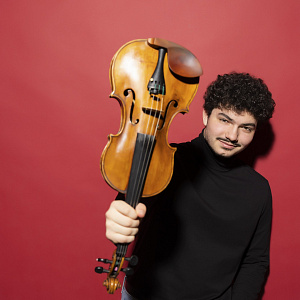
DANIEL MATEJČA
MY ALBUM IS A DREAM COME TRUE!


Daniel Matejča has played the violin since the tender of age of four. After being taught the rudiments by his mother, a violinist herself, at the age of seven he began taking lessons from Ivan Štraus, under whose tutelage he is now studying at the Faculty of Music of the Academy of Performing Arts in Prague. Daniel Matejča has gathered numerous accolades. Three years ago, he became overall winner of the prestigious Kocián Violin Competition; in 2020, he advanced to the final of Czech Radio’s Concertino Praga contest; last year, he came first in the closely observed Virtuosos V4+ international television show. His most recent successes include victory in the 2022 Eurovision Young Musicians competition in Montpellier, France. At the end of April, he celebrated his 18th birthday with the debut album, a “dream come true”, as Daniel himself says. When the gifted violinist needs to switch off, he immerses in jazz improvisation on the piano or vibraphone. Or he goes skateboarding. We talked to Daniel Matejča a few days prior to the release of his first album.
How do you perceive your victory in the 2022 Eurovision Young Musicians competition?
I consider it my greatest success to date. The competition is widely popular and watched, yet is not regarded as an ordinary TV talent show, which I find agreeable. The venue was exquisite, the orchestra superb, and the conductor and I understood each other. It was truly exciting to play Shostakovich there. What is more, as the competition winner, I was afforded numerous concert opportunities, including a recent inspiring performance with the Košice Philharmonic.
Why did you choose Eugène Ysaÿe’s Six Sonatas for solo violin for your debut album?
It’s a set representing my musical taste, as well as musical development. The album encapsulates five years of my life. I began playing Ysaÿe’s sonatas when I was 12, starting with the second. The music so enraptured me that I decided to learn all of them. Five years later, I was given the opportunity to make a recording and I am delighted that my very first album features such fascinating and wonderful pieces.
What should the listener know about Eugène Ysaÿe?
The Belgian artist is still deemed one of the greatest virtuoso violinists of all time. The set of Six Sonatas is Ysaÿe’s best-known creation. Listeners may also know the Étude en forme de valse and the Poème élégiaque. Ysaÿe’s sonatas are similar in many a respect to J. S. Bach’s sonatas and partitas, with which the composer was clearly obsessed. Each sonata is singular, has its own story – when it comes to No. 1, the uninformed listener may now and then even assume that it is a Bach piece, while No. 5 comes across as entirely Impressionist: two movements, two images. The sonatas are highly contrastive, and the whole set is magical indeed.
How did the recording go?
It was really interesting and enjoyable. I looked forward to each and every recording session! Working with the recording director Milan Puklický, the sound engineer Karel Soukeník, as well as Professor Ivan Štraus, who was also present in the studio, was simply amazing! Frequencies are always physically challenging, so I usually fell asleep within an hour after a recording session. Yet I approached it with great enthusiasm, even euphoria, bearing in mind I was making an album that would be a dream come true.
What concerts and other noteworthy events have you in store?
By the end of the season, I will have some concerts with orchestras – the Pardubice and Brno Philharmonics, for instance ... In July, I will give a recital, mainly featuring Bartók’s music, at the Corum centre within the Festival Radio France Occitanie Montpellier, which I’m really looking forward to. And I cannot wait to perform my beloved Shostakovich Violin Concerto No. 1 in September at the opening of the Lednice-Valtice Music Festival.
You also play percussion, don’t you?
Before enrolling at the Academy Performing Arts, I regularly played percussion at concerts too, yet, regrettably, today I seldom have time to do so. When there is a piano available on the stage, I like encoring some of my jazz arrangements. Recently I added the song Over the Rainbow in Japan – in my own arrangement, inspired by Keith Jarrett.
What music and what artists do you listen to in your free time?
When I want to switch off, I listen to jazz. I love all its genres and subgenres – soul jazz, jazz fusion, jazz funk, jazz hop ... When it comes to artists, I particularly like Keith Jarrett, but also The RH Factor, Chick Corea, Bobby McFerrin, Jacob Collier, Alfa Mist … and I could keep going on and on. I don’t listen to classical music that much during my free time, yet if I do, I mostly opt for Shostakovich, Bartók, Szymanowski or Ravel. In general, I give preference to 20th-century composers. I most often listen to music when travelling, on Spotify.
Daniel, I’ve heard you do skateboard jumps.
Skateboarding is an activity during which I can get away from it all, especially since I am within a culture that is in stark contrast to classical music. Naturally, I am occasionally worried about injuring my hands. But which musician isn’t? (Smiles)